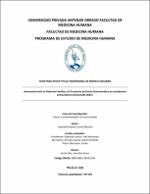Asociación entre la Violencia Familiar y el Trastorno de Estrés Postraumático en estudiantes universitarios del periodo 2023-I
Abstract
Objetivos: Determinar si existe asociación entre el antecedente de Violencia Familiar y el trastorno de estrés postraumático(TEPT). Determinar otras posibles causas asociadas al trastorno de estrés postraumático.
Material y método: Se realizó un estudio analítico de tipo transversal. Donde se trabajó con los estudiantes de todas las carreras que cursaban por el periodo 2023-I de la Universidad Privada Antenor Orrego. Se realizó muestreo probabilístico de tipo estratificado, un total de 488 estudiantes respondieron la encuesta, de los cuales solo 327 cumplían con los criterios de selección. La encuesta comprendía preguntas para identificar factores sociodemográficos y dos test diagnósticos, uno fue el Test para identificar situaciones que causen Estrés Postraumático en Estudiantes Universitarios y el otro el PCL-C-versión para civiles para diagnosticar TEPT.
Resultados: Del total de participantes se encontró que el 30.3% de alumnos tuvieron TEPT, también se encontró que el antecedente de violencia familiar estuvo presente en 42.8% de los alumnos; se demostró también que la frecuencia de estudiantes que tuvieron TEPT y antecedente de violencia familiar fue de 56.4% comparado con el 10.7% que tuvo TEPT pero no tuvo antecedente de violencia familiar, se evidencia también que 43.6% de estudiantes que tuvo antecedente de violencia familiar no desarrollo TEPT. Se encontró que el antecedente de violencia familiar está asociado al desarrollo de TEPT, así como el ser perseguido y/o vigilado y el estar expuesto a una sustancia peligrosa. Pertenecer al género femenino demostró ser un factor asociado al TEPT. No se encontró asociación significativa entre la raza, la procedencia, estatus económico con el desarrollo de TEPT.
Conclusiones: El antecedente de violencia familiar demostró estar asociado al desarrollo de TEPT, pertenecer al sexo femenino demostró estar asociado al desarrollo de TEPT, no se encontro asociación entre la procedencia, raza y estatus económico con el desarrollo de TEPT. Objectives: Determinate if there is an association between a history of Family Violence and Post-Traumatic Stress Disorder (PTSD). To identify other possible factors associated with PTSD.
Materials and Methods: A cross-sectional analytical study was conducted. It involved students from all majors enrolled during the 2023-I academic period at Antenor Orrego Private University. Stratified probability sampling was employed, and a total of 488 students responded to the survey, of which only 327 met the selection criteria. The survey included questions to identify sociodemographic factors and two diagnostic tests: one was the Test for Identifying Situations that Cause Post-Traumatic Stress in University Students, and the other was the PCL-C civilian version for diagnosing PTSD.
Results: Out of all participants, 30.3% of students had PTSD, and it was found that a history of family violence was present in 42.8% of students. It was also demonstrated that the frequency of students who had PTSD and a history of family violence was 56.4%, compared to 10.7% who had PTSD but no history of family violence. Additionally, 43.6% of students with a history of family violence did not develop PTSD. It was found that a history of family violence is associated with the development of PTSD, as well as experiencing persecution and/or surveillance and exposure to dangerous substances. Being female was shown to be a factor associated with PTSD. No significant association was found between race, origin, economic status, and the development of PTSD.
Conclusions: A history of family violence was shown to be associated with the development of PTSD, and being female was also associated with PTSD. There was no association found between race, origin, economic status, and the development of PTSD.
To determine whetherADHD, anxiety and depressión as a risk factor for poor academic perfomance of medical students of the Antenor Orrego Private University.
MATERIAL AND METHODS:
An observational study was conducted, cross-sectional cohort surveys were conducted to students of 2,3,4 and 5 cycle of the human medicine career of the Private University Antenor Orrego, having as population 252 students.
RESULTS:
Searching for a link between attention deficit hyperactivity disorder, anxiety and depression with poor academic performance, the results of the surveys gave us the result that depression and anxiety are risk factors associated with poor academic performance while ADHD is not a risk factor associated with poor academic performance.
CONCLUSIONS:
Depression and anxiety are risk factors for poor academic performance, attention deficit hyperactivity disorder is not a risk factor for poor academic performance.
Collections
- Medicina Humana [2969]


